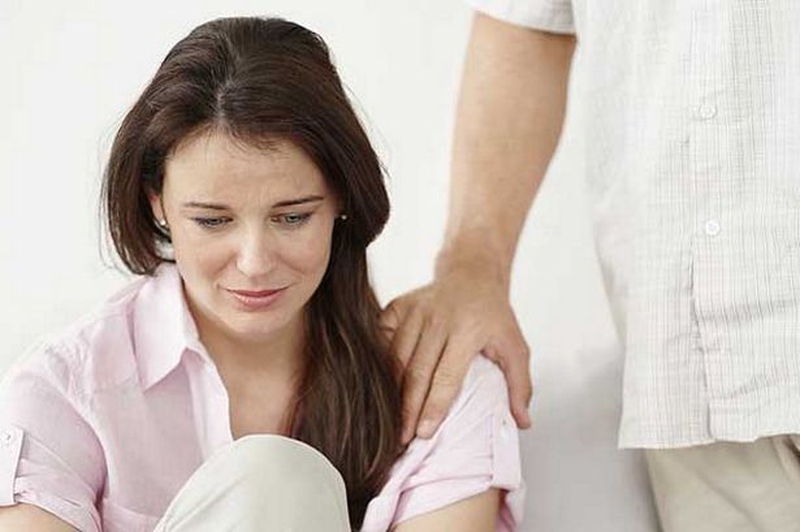More than 50% of pregnancies end in miscarriages, according to the March of Dimes. However, most of these miscarriages occur before the woman even realizes that she is pregnant. Miscarriages are classified as the loss of a fetus before the pregnancy hits the 20 week mark. Most times, miscarriages occur within the first trimester and after that, they become less common. In the medical field, a miscarriage is called a spontaneous abortion, but this is not really the case, as a miscarriage happens for several reasons within the body. But what does a miscarriage look like? What can I do after a miscarriage? Stay calm and let's find out the answers.

What Does a Miscarriage Look Like?
Bleeding
For many people, when they think about "what does a miscarriage look like?" the first scene in mind is bleeding. Actually, many women notice when a miscarriage starts to happen they will have bright light or heavy red bleeding. However, bleeding is rather normal during the first weeks of pregnancy, so it needs to be checked by a doctor.
Pain and Cramping
Many women have pain and cramping, when they are experiencing a miscarriage. Cramping is normal during pregnancy, but if it is intense, just happens at one side of the abdomen or involves bleeding, it could be a cause for concern. Pain in the lower back often accompanies dull and throbbing cramps.
Unusual Vaginal Discharge
Sometimes unusual vaginal discharges can be a sign of a miscarriage. If the discharge includes blood clots, fluid, a foul smell or bits of gray matter, it might mean that you are losing the baby. Most professionals recommend that if this is the case, you need see a doctor immediately and try to get some of the discharge for exam.
Contradictory Results from Pregnancy Test
Many women who miscarry often have a positive pregnant test at first followed by a negative pregnancy test. This is due to the hormones going back to normal levels as the fetus is being miscarried. If this happens, immediate medical care is needed.
Decreased Pregnancy Symptoms
When a woman starts to notice that the symptoms of pregnancy are no longer there, it could be a sign that the pregnancy is ending. For example, the woman may experience no more nausea, breast tenderness or vomiting. This is not always the case and it could mean the hormones are back to normal. However, a blood test would be needed in order to determine if the pregnancy is still viable.
Why Does Miscarriage Happen?
Risk Factor of Miscarriages
Risk Factor | Description |
Age | The older a woman is, the higher the chance of miscarriage is. Studies have found that women in their 20’s have a 20% chance of miscarriage, while this percentage increases to 25% by the age of 40. |
Underlying health conditions | There are several health conditions that can result in miscarriage, including heart issues, uncontrolled diabetes, kidney disease, immune system disorders, malnutrition, thyroid diseases, infections, hormonal problems and even an incompetent cervix. |
Other risk factors | Other risk factors that can increase the chances of miscarriage are being around miscarriage-inducing factors such as radiation, chemicals, smoking, drinking and using drugs. |
Deal With the Enormous Grief of Miscarriage
Stop Blaming Yourself
Due to the nature of a miscarriage, it is hard to pinpoint just why this happens. You should under no circumstances blame yourself for this tragedy, just try to accept the tragedy and let yourself grieve. Keep it in mind that you need to talk with your partner about how this affects you, share each other's sorrow and give each other support.
Take Time to Heal
Do not feel as though you have to be over your grief and live on with your life at a certain point. Things like this need time to heal and at times this grief may come back and hurt again. You should believe that with time you will become better and be happy again.
Understand the Way Your Partner Grieves
Typically, men and women do not grieve in the same way. Men tend to bottle up their feelings and emotions, while women need to talk about them openly. Never just judge from the way your partner grieves and think that he or she doesn't care because everyone grieves differently. It is important to discuss the issues and grieve together in whatever way feels best.
Share Your Feelings with Others
Talk with others, as you will be amazed to find that several of your friends, family and co-workers may have found themselves in your place before. They can be a great help in simply listening to you and offering encouragement. However, be aware that some people may not know what to say and do not feel as though they don't care. This is a subject that many do not know how to handle.
Seek Professional Advice
Ask your doctor about the support groups that may be available in your area. There are several groups focused to providing support to women who have experienced the same thing. Your doctor may suggest a counseling group or a therapist that can help you dealing with what you are going through. All though you have had a miscarriage, this does not mean that you have fertility issues. If you want to start a family and have a baby, be sure to talk with your doctor and find the best timing for later pregnancy.
- 1.
- 2.







View All Comments /Add Comment